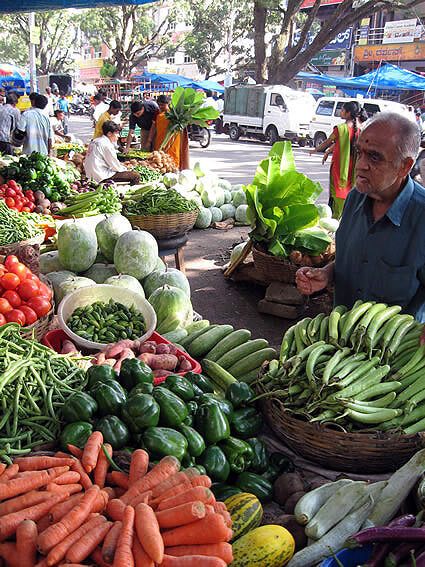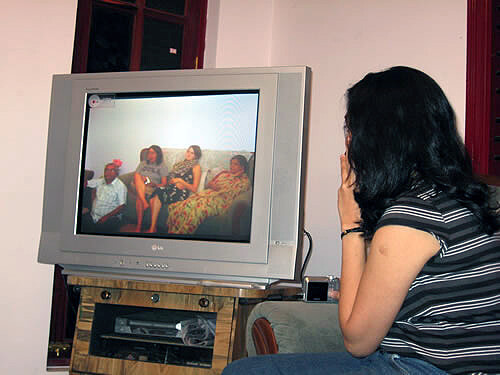|
In-Between Cultures
Study Abroad and Cultural Immersion in Bangalore, India
Article and Photos by Diana Jue

|
|
A man selling vegetables at a stand in Bangalore market.
|
The following is a list of vivid phrases that I immediately wrote up immediately after I returned to the United States to describe Bangalore: meandering cows, trash, spit bins, extended families, the head nod with multiple meanings, auto rickshaws, colorful saris, noise, outdoor eating, markets, no maps, two-wheelers, temples, men holding hands, masala dosas (a Southern Indian omelet), spices, bucket showers, squat toilets, hard mattresses, crazy traffic with underutilized lanes, broken infrastructure, and learning to cross the street without getting killed.
The list revives memories and encapsulates that indescribable air, that je ne sais quoi that left me in love with Bangalore. Perhaps the best name for what I fail to describe is culture, which has the anthropological definition of “the sum total of ways of living built up by a group of human beings and transmitted from one generation to another.” This definition implies cultural stagnancy, but Bangalore’s urban culture was dynamic.
My Semester Study, Observations, and Immersion in Westernized Bangalore
During the fall semester of my junior year at the Massachusetts Institute of Technology, I studied abroad on a comparative cities program that traveled to Buenos Aires, Argentina; Bangalore, India; and Beijing and Shanghai, China. I’m a double major in urban studies and planning and economics. I am currently interested in the nebulous professional field of international development. Before the trip, my formal education had been highly quantitative and analytical. Therefore, I was surprised that something non-technical and observation-based anthropology — or the study of the people surrounding me — interested me and enveloped my thoughts and questions. I shouldn’t have been too shocked, though. I decided to study abroad precisely because I knew I couldn’t learn certain things from a classroom in Boston, Massachusetts.
The global economy is characterized by the cross-national exchange of goods and, inevitably, ideas, values, and cultures. New city developments were built for an international audience to attract foreign investors and gain worldwide recognition. Bangalore had Brigade Road, where I stopped by the McDonald’s for lunch; Shanghai had a downtown that was accurately painted as a New York-like city. As a result, these developments were more Western and would not seem out of place in the United States. But does development have a predominantly Western direction? Do development and Westernization necessarily have to coincide?
Western influences were clearly becoming more ingrained in the lifestyles of Bangalore’s young people, which starkly contrasted with their parents’. My host cousin, Vinay, was a 22-year-old college graduate who loved everything American. He plastered America’s poster boy and role model on his bedroom wall, the Top Gun-era Tom Cruise. As a support guy for Australia’s Symantec users, Vinay had a sizable income for a single guy. With that money, he bought a new car.
Around midnight one Friday evening, Vinay and two of his female cousins showed up at my house to ask if my host brother, roommate, and I wanted to get ice cream. The innocent request for a play date turned into an hour-long joy ride (minus the theft) through Bangalore’s empty nighttime streets. With the six of us crammed into his tiny blue sports car, Vinay sped on a roundabout route across the city to the Leela Palace, one of Bangalore’s five-star hotels with a few places with a late-night food joint. Along the way, Vinay blasted his favorite American pop, hip-hop, and country music mix. With the windows down, sporadic motorcyclists staring at us in bewilderment, driving through a city I barely knew with people I had just met, I can honestly say that this was my most ridiculous yet favorite way so far to sing along to N*SYNC’s Bye Bye Bye.
Midnight joy riding was probably not a regular activity enjoyed by the previous generation. They lacked the disposable cash of today’s young urban professionals. They didn’t grow up with satellite television, a ubiquitous fixture of Bangalore’s middle-class homes that transmitted images of the Western lifestyle. India’s education system produced a high-tech generation that gained global awareness and connectivity through the internet and cell phones.
A changing culture influenced by the West was very evident in fashion; among young urban women, jeans were gaining popularity. My host sister, Swetha, rarely wore a sari. The Western food influence was apparent when I met Bangalore natives at Pizza Hut for lunch. It was quite clearly evident, especially in "consumption" patterns, as my host brother splurged on a brand-new stereo system for his father’s bedroom.
Changes were also evident in the family structure. My host mother didn’t work because she was born into a well-off merchant family, and few women of her generation held jobs. However, her recently married daughter works full-time at Accenture. My host parents had an arranged marriage, but Swetha had a cross-caste “love marriage.” My host family lived on a multi-family compound behind my grandfather’s store. Now, most relatives live in nearby single-family homes.

|
|
Watching a large modern television withthe family; Western influences everywhere.
|
On one hand, the changes extended rights to women and otherwise outcast members of society. On the other hand, the changes seemed to normalize everything that made India unique and exhilarating. The new Bangalore was at the same time bland, more of the same, almost run-of-the-mill for anyone coming from the West.
A Time to Rexamine and Learn from Preconceptions
On a backwater tour of Kochin, a fishing community, a friend and I were mourning how Kochin citizens displayed themselves like animals in their native habitats for tourist money. Then, we examined our prejudices. Were we maintaining over-romanticized notions about untouched natives who would make more economic progress if they opened up to outside influence? Was it wrong for us outsiders to insist on preserving a local culture?
Every Friday and Saturday evening, my host father, Prabhakara, sat cross-legged on the rug in front of his television to watch his favorite show, Star Voice of India, India’s version of American Idol. For the next two hours, our house teemed with the powerful, fluctuating Hindi vocals of young Indian Bollywood star wannabes. The show's emcee and judges spoke Hindi smattered with English; I understood every five words on average.
Now, there is a national pastime based on the phenomenon of global singing competitions. However, Indians adapted it to local flair through music, tongue, clothing, dramatic filming style, and public behavior such as displays of emotion and affection between men. This wasn’t the culture clash I had envisioned mourned. The local culture expressed its national identity by giving new meaning to an element of global culture. There was no cultural genocide, cultural sharing, or cultural selling out. Star Voice of India was a prime example of cultural adaptation. This locally initiated effort was all Indian and hopefully an example of future development.
I could not have expanded my awareness of the cultural components of international development if I had not traveled. This trip gave me my first real experience of cultural immersion, and it revealed so many personal biases that I held as an American. The way that I understood international development as a linear process — one in which there is an end-point that happened to be Western in character — was completely backward and insensitive.
One crucial life aptitude that was honed on this trip was the ability to understand people based on keen observation. This skill is not something I can only apply to the strangers who surround me when I’m in a foreign land. It applies daily to anyone, anywhere, particularly to people I already know. The ability transcended my life’s academic and social worlds. I’m grateful for the opportunity to discover it through studying abroad.
Diana Jue is a junior at MIT who is double majoring in urban studies and planning and economics. She is interested in issues of developing nations and their people. Diana is originally from Los Angeles, California, and enjoys writing and conversing about life.
|
